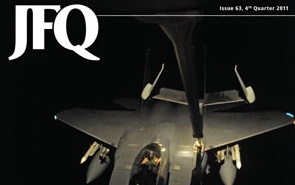This is in response to the Joint Forces Quarterly article Who Is a Member of the Military Profession? by COL Matthew Moten
Are Noncommissioned Officers Professional?

In “Who Is a Member of the Military Profession?” (JFQ 62, 3d Quarter 2011), Colonel Matthew Moten, USA, brings up some valuable points in his discussion of the professionalization of career enlisted Servicemembers, but it would be useful to know his data points. His final arguments are directed at the noncommissioned officer (NCO) corps (not petty officers), so I would like to know if his data are based on his experiences across the Services, or mainly based on his observations and study within his own branch.
Though observant of and an occasional researcher of other Services’ use of their professional enlisted forces, I speak only about the modern U.S. Army NCO corps when addressing Colonel Moten’s point that “their [the NCO corps] professionalization is incomplete in the areas of formal and theoretical education, accumulation of specialized expertise, and autonomous jurisdiction over a body of professional knowledge. The NCO corps is professionalizing, but not yet professional.” I understand that this assertion is not the same as stating the “NCO corps is unprofessional,” which one could easily and incorrectly conclude. I imagine a parallel could be drawn with the theory that an individual found not guilty of a crime is not saying he is innocent.
I would suggest that the Army began professionalizing its NCO corps in October 1975 when the Deputy Chief of Staff for Personnel started phasing in the Enlisted Professional Management System (EPMS). Before that, career programs for enlisted Soldiers were spotty at best, and most have heard the story that a Soldier’s stripes resided in the regiment. If an NCO were to move, it was often at a loss of rank. Not only was EPMS a major jumpstart to professionalizing the enlisted force, but 3 years earlier, an NCO college had been created: the U.S. Army Sergeants Major Academy. I would be curious as to what length Colonel Moten went through to evaluate the current curriculum in determining the breadth and width of the sergeant major course, particularly in how it relates to his definition of “formal and theoretical education.”
One would have to ask what the measure of the “attainment of specialized expertise” is, and how one would know when the Army NCO corps (or any other professional enlisted force) has achieved specialized expertise, and by whose standards. Is there an established peak or defined scale by which one measures individual or group progress, other than to say, “You are progressing”? It seems that comment would be nebulous at best considering that Colonel Moten never seems to point out anything where the Army NCO corps lacks specialized expertise. Nor does he contrast how other groups have mastered specialized expertise over the NCO corps. Army NCOs draw their skills, knowledge, and attitudes from policies that lay out their roles and responsibilities. I try to use Army Command Policy and Procedures (Army Regulation [AR] 600–20) as a guideline, which has been influenced by a successive group of Army leaders who have laid out the responsibilities of the NCO corps vis-à-vis the NCO Support channel. A quick look shows the current 10 functions of the NCO Support channel as:
- transmitting, instilling, and ensuring the efficacy of the professional Army ethic
- planning and conducting the day-to-day unit operations within prescribed policies and directives
- training of enlisted Soldiers in their Military Occupational Specialty as well as in the basic skills and attributes of a Soldier
- supervising unit physical fitness training and ensuring that unit Soldiers comply with the weight and appearance standards of AR 600–9 and AR 670–1
- teaching Soldiers the history of the Army, to include military customs, courtesies, and traditions
- caring for individual Soldiers and their families, both on and off duty
- teaching Soldiers the mission of the unit and developing individual training programs to support the mission
- accounting for and maintaining individual arms and equipment of enlisted Soldiers and unit equipment under their control
- administering and monitoring the NCO professional development program, and other unit training programs
- achieving and maintaining courage, candor, competence, commitment, and compassion.
If this is what is expected from the NCO corps, one would have to measure against these tasks to determine when expertise has been achieved. Of course, if the problem is that these are not the correct 10 functions of the NCO Support channel, that is an entirely different discussion, which is not addressed in Colonel Moten’s article.
I believe recent developments in the Army NCO corps have mostly negated the remainder of his argument. We recently celebrated the second year of the Institute for Noncommissioned Officer Professional Development (INCOPD), which is dedicated to the advancement of professional military education for NCOs. Additionally, the Command Sergeant Major Corps was entrusted with leading the development and education of NCOs with the appointment of an enlisted Commandant of the Sergeants Major Academy. Recent efforts—such as the INCOPD program of life-long learning, structured self-development (SSD), and career tracker—bridge “the operational and institutional domains of Army training for enlisted Soldiers. From Private to Command Sergeant Major, SSD will ensure learning is continuous and enduring.”
My last point is on the concern of a lack of “autonomous jurisdiction over a body of professional knowledge.” I suggest the triad of the Sergeant Major of the Army, the NCO-led Sergeants Major Academy, and INCOPD, under the direction of the U.S. Army Training and Doctrine Command’s Command Sergeant Major, fills the bill for the “autonomous jurisdiction,” but in a hierarchical organization such as the Army, who truly self-governs or acts independently? I suggest those three positions act autonomously as a platoon leader on patrol or a company commander maneuvering his forces.

Totally agree with you here. There is no way to be completely clear as to who is who. I wish the military did a better job at clarifying this.